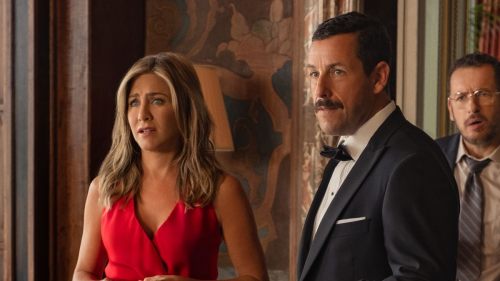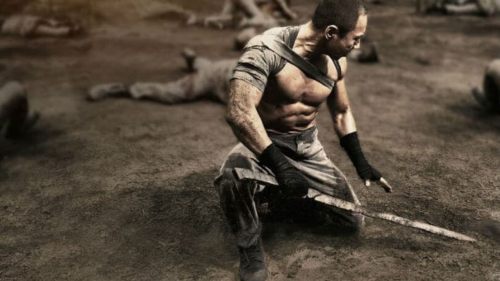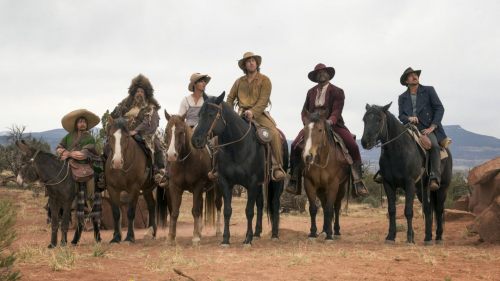Fantastic Fest Review: IN THE TALL GRASS Gets Lost Along The Way
Note: This post contains mild spoilers.
It is a really great time to be a Stephen King fan. His work's being adapted in greater numbers even than his 1980s heyday, including novels and short stories, featuring material that covers a broad gamut of subjects. But as storytellers venture further into the marginal and more obscure projects from his expansive bibliography, the substance and quality of those adaptations seems to vary even more wildly than ever before. For Netflix, Vincenzo Natali has brought the landscape of In The Tall Grass to life with a sharp and vivid visual sense; his aptitude for photographing its verdant landscape rivals Terrence Malick’s in terms of shot variety, inventiveness and beauty. But Natali’s script seems unsure whether his characters’ peccadilloes are an asset or liability, and so he fails to properly balance their needs and the mysterious motives of his deadly, ever-changing landscape, creating a thriller that’s gorgeous and intermittently compelling but just doesn’t make a whole lot of sense by the time the last secret has been unearthed.
Laysla De Oliveira and Avery Whitted play Becky and Cal Demuth, siblings driving across country to meet with a foster family in San Diego who might adopt Becky’s unborn child. Stopping along the road to accommodate Becky’s delicate condition, they arrive next to a field of tall grass where they hear a boy crying for help from somewhere inside. He tells them his name is Tobin (Will Buie Jr.); he and his parents, Natalie (Rachel Wilson) and Ross Humboldt (Patrick Wilson), are lost and cannot find their way out. Becky and Cal venture into the field to help Tobin, but soon find themselves lost, and before long, are separated from each other. But when Ross unexpectedly shows up offering assistance to Becky, she’s forced to trust the stranger to keep her and her child from harm.
After stumbling across the body of a dog that died from exhaustion, Cal finds Tobin, who explains that there’s something strange about the field, and that it is manipulating their ability to find one another, and to escape. But just as they start to decipher the landscape’s confusing machinations, Travis (Harrison Gilbertson), Becky’s estranged boyfriend shows up, teaching them that not just hours or days but months have passed, and each moment they spend in the grass leads them closer to their deaths - at least, if they refuse to acquiesce to the strange and violent demands of the earth that’s moving beneath their feet.
Although I’ve never seen two actors who look less like siblings to one another than De Oliveira and Whitted, there’s something fascinating about the film’s focus on family dynamics, first theirs and later the Humboldts, that feeds the plot in a different way than if the potential victims were “just” boyfriend and girlfriend, or a random group of teenagers. It automatically humanizes their relationships while deepening the mysteries of their motivations once they start figuring out what this field of grass is doing, and why. It also makes their sense of protectiveness and loss mean more when Bad Things Start Happening.
Unfortunately, however, the movie peaks early, after the characters discover that time exists in a sort of loop inside the grass, so they might discover a detail about their fate that has not yet occurred, and use that knowledge to make different choices. This is the richest and most interesting sequence in the film, as the characters actually begin to find one another as they learn the mechanics of the field and attempt to form a plan to escape. The jacob’s ladder-like progress they make elevates the premise and in a rare exception for a horror film, actually increases the number of characters on screen. But this also happens early in the film - maybe too early, because it allows too much time that has to be filled with additional complications and ideas about What The Grass Wants that end up being much less interesting and far more conventional than what preceded them. By the end of the film, it’s effectively yielded to being a fairly conventional slasher movie with ambiguous supernatural overtones that allow the filmmakers to make any choice they want but very few that follow naturally or make sense to the audience.
After playing the wholesome Ed Warren in James Wan’s Conjuring franchise, Patrick Wilson really sinks his teeth into the mysteries and eventual menace of Ross Humboldt, utilizing his natural charm to subvert expectations and keep audiences on their toes. Buie is another standout as Ross’ son Tobin, a kid who knows too much about the world within the grass but lacks the sophistication to figure out a way out. Whitted has a Jon Cryer-as-Duckie kind of quality that tests the wholesomeness of his bond with sister Becky, but De Oliveira carries much of the weight of that relationship on screen as she wrestles with a number of relationships - including with her ex Travis - that are not as stable and consistent as a young future mother needs.
Given the limitations of the location, Natali again does an incredible job photographing the grass and the movement of the field so it feels like a living being, swallowing and manipulating these poor people as they try to find pathways and exits. But even if he makes some important and necessary changes that depart from King’s source material (written with his son Joe Hill), he never quite arrives at a conclusion that unifies those promising early ideas into something meaningful or powerful or even that sort of clearly defines what these people have experienced. Ultimately, In The Tall Grass is handsome and frequently very well acted, but it feels more like a missed opportunity than a successful adaptation; the film touches on an idea that there are spirits and perhaps ancient entities driving us towards feelings and fates that are bigger than any one of us, but it’s so obsessed with keeping the audience unmoored and off guard that the meaningful connection or even just a powerful payoff Natali hoped to elicit from King’s work ends up staying similarly out of reach.



